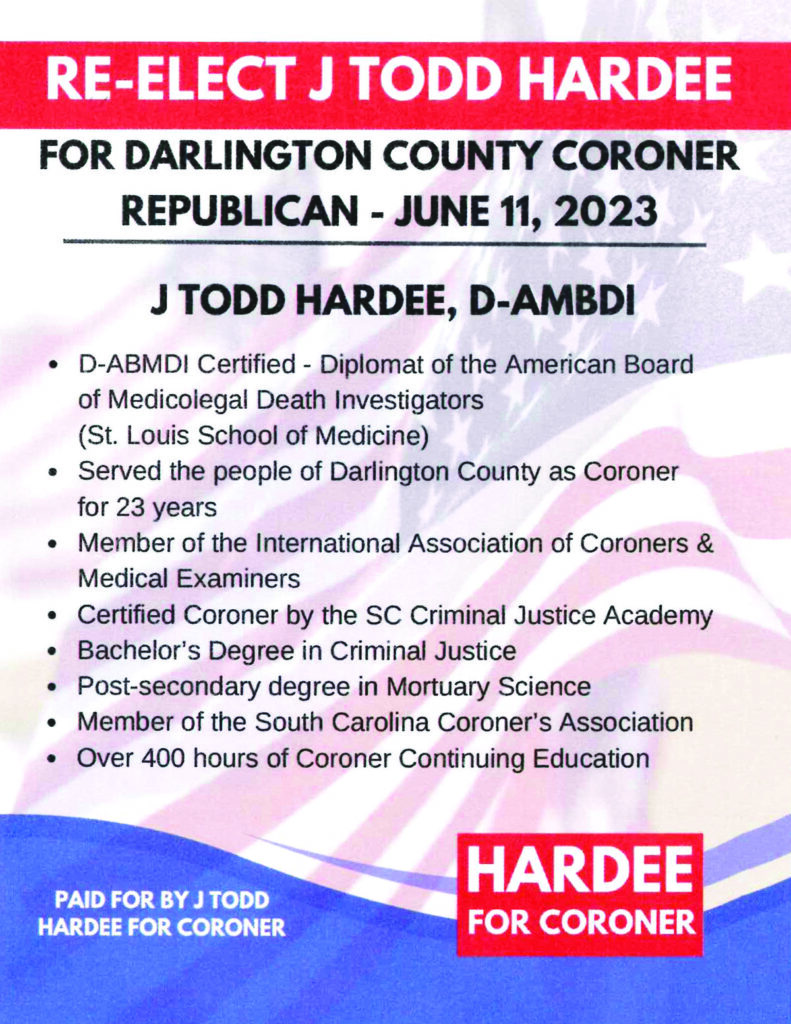A Mule, A Mayor, and the Wagon Man

By Max Everhart, Special to the News and Press
In the summer of 1974, Glenn Lawhon, Jr., the mayor of Hartsville, started receiving letters from all around the country and Canada comparing him to Adolf Hitler.
And why would perfect strangers write and send hateful missives to the mayor of a small town in rural South Carolina?
Because of a mule named Big Red.
That’s why.
Story goes like this:
That August, Early Wilds, a seventy-four-year-old African-American man who’d made his living plowing gardens with mules for almost fifty years, was informed by the local government that he had to remove Big Red from the city limits, or face a $100-a-day fine. Wilds couldn’t afford to buy or rent land outside the city limits where he could legally keep the mule, an animal he depended on to earn a living and as a means of transportation.
So Wilds, the “Wagon Man” as he was known around town, was in a real pickle.
Until the townsfolk caught wind of what was going on, and they took action. A petition to allow Wilds to keep Big Red in town began to circulate. Over three hundred people signed it. Other citizens began publically criticizing Mayor Lawhon for trying to take away an honest man’s mule, a man who just so happened to be blind in one eye.
Soon after, the local newspaper picked up on the story, focusing its narrative on the Dickensian aspect. The headline in an August edition of The Hartsville Messenger read “Law Threatens ‘Wagon Man’s’ Way of Life.” Accompanying the article was a grainy, black-and-white photograph of Early Wilds sitting atop a wooden wagon. Wearing a fedora, black spectacles, and suspenders, Wilds was holding the reigns to a majestic-looking creature that looked more like a thoroughbred than a mule. In the article, he was quoted as saying, “My eyes are bad; I can’t see good enough to drive a tractor or automobile or anything else. I have to use the mule.”
After studying the picture of Wilds, I asked myself, “What kind of monster would take a mule away from a half-blind, working man?”
Apparently, I wasn’t the only person to ask that question.
The Wagon Man story was picked up nationally, and all those letter writers out there who were still angry about Watergate and Nixon directed their ire, whether right or wrong, toward one man: Mayor Lawhon. A veterinarian by trade of all things, Lawhon became the villain, and a convenient one at that. On August 9th, 1974, Nixon resigned in disgrace, and Lawhon could be, at a quick glance, compared to Tricky Dick. Both were white men in suits who held power via elected office. Lawhon had power; Early Wilds (and Big Red) were powerless. To many, it was just that simple.
Except it wasn’t that simple.
I noticed as I read through Lawhon’s quotes in the newspaper that the mayor was simply trying to uphold a 1968 law that prohibited horses, mules, chickens, and hogs within the Hartsville city limits. Mayor Lawhon also stated, in more than one article, that he understood and respected the bond between Man and Animal, but that he had sworn to uphold the law and he couldn’t play favorites the way previous administrations had. For years, the powers that be in Hartsville had looked the other way regarding Big Red. Then, in the summer of ‘74, someone made a complaint about a horse. The complaint had nothing to do with Early Wilds or his mule. But if Lawhon, by all accounts a fair-minded man, had to enforce the law against one man’s horse then he had to enforce it against the Wagon Man’s mule, too.
So Mayor Lawhon was in a real pickle, too.
In the second week of September, the matter went before the Civil and Criminal Court in Darlington County. According to an article in The Hartsville Messenger on September 11, Judge Cook “ruled the Hartsville ordinance perfectly legal but. . .his court was also a court of equity and that the specific circumstances of this case made enforcing the ordinance against Early Wilds inequitable.” In other words, Big Red could stay, much to the delight of Early Wilds and Mayor Lawhon, who claimed there was “no reason why legality and compassion must be incompatible.” The photograph accompanying this article: a close-up of Ethel Wilds planting “a victory kiss” on her husband’s cheek, Early Wilds smiling like a sweepstakes winner.
But that wasn’t the end of the story.
After Judge Cook handed down his decision, Big Red, a sixteen-year old mule, was made an honorary citizen of Hartsville, South Carolina.
Now, my cynical side wants to call this act a bit of PR face-saving on the part of an embattled mayor, who’d been unjustly vilified in the press. Still, another part of me—the part that gets choked up occasionally while watching fireworks on the Fourth of July—needs to believe that maybe, just this once, a politician did the Right Thing.
Early Wilds had a good run, shuffling off this mortal coil in Winchester, Virginia at the ripe old age of 88. Because he fought city hall and actually won, and because he raised children and loved his wife and worked the soil of my adopted hometown for over half a century, beginning in 1924 when he earned 25 cents an hour plowing gardens, he was a hero in my book.
Ah, but Big Red was a legend.
And as the saying goes, heroes get remembered, but legends never die.


